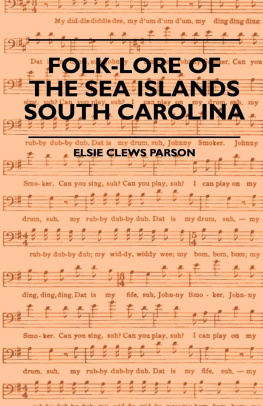TUSCAN FOLK-LORE
AND
SKETCHES
See p.
FLORENCE FROM THE PIAZZALE MICHEL ANGELO
A Land of Cypresses and Olives
TUSCAN FOLK-LORE
AND SKETCHES
TOGETHER WITH SOME
OTHER PAPERS
BY
ISABELLA M. ANDERTON
Edited, with a BIOGRAPHICAL NOTE, by her brothers
H. Orsmond Anderton and Basil Anderton
London
ARNOLD FAIRBAIRNS
20 Cheapside , E.C.
1905
THE CAMPFIELD PRESS
ST. ALBANS
TUSCAN FOLK-LORE
THE following stories were told to me by various peasants during a summer stay amid the Tuscan Apennines above Pistoia. I had gone there with a companion in search of quiet for the summer holidays. But I fell ill, and, there being no nurses and no doctors, was tended by an old peasant woman, who, living alone (for her sons had married and left her), was only too glad to spend the warmth of her heart in keeping me company and tending me to the best of her ability. Long were the hours which she spent by my bedside, or by my hammock in the woods, knitting and telling me stories. She would take no payment for her time, for was she not born a twin-sister? and everyone knows that a twin-sister, left alone, must needs attach herself to someone else in the emptiness of her heart. So old Clementina attached herself to me as long as I stopped in that village; and when I left it she would write me, by means of the scrivano, long letters full of village news, and expressions of affection in the sweet poetical Tuscan tongue.
Indelibly is the remembrance of the kind hospitality of those peasants impressed on my mind. For Clementina, although my dearest, was by no means my only friend. I had to leave her as soon as I could be moved, for a village which boasted at any rate a chemists and a butchers; and there, in the two months of my stay, wandering about among the little farms, either alone, or in the company of a woman whose husband had sent her back for the summer to her native place, I had continual opportunities of chatting with the people and enjoying their disinterested hospitality. Such records as I have preserved I give to the public, thinking that others, too, might like to penetrate into that quiet country world, see the workings of the peasant mind in one or two of their stories, and note the curiously altered versions of childhood acquaintances or of old legends which have found their way into those remote regions: note, too, the lack of imagination, and the shrewdness visible in the tales which are indigenous. As regards style, I have endeavoured to preserve as closely as possible the old womans diction.
A TUSCAN SNOW-WHITE AND THE DWARFS
IT was old Clementinaa white-haired, delicate-featured peasant woman, with a brightly-coloured handkerchief tied cornerwise on her head, a big ball of coarse white wool stuck on a little stick in the right-hand side of the band of her big apron, and the sock she was knitting carried in the other hand. My companion had gone down to Pistoia to do some shopping: I was alone in our rooms in the straggling primitive little village that clings to the hill among the chestnut woods above. Clementina thought I must be very lonely; besides, she was anxious to know what sort of things these extraordinary forestieriforeignersdid all by themselves. They wrote, she believedwell, but how did they look when they were writing, and what sort of tools did they use? So she suddenly appeared in the doorway with a bright smile, and:Buon giorno a Lei. It was just lunch time, so I pushed aside my work, glad enough, as it happened, to see her; begged her to sit down and tell me while I ate, one of those nice stories which she, as great-grandmother, must know so well.
My lunch was the necci of the country peoplea cake of sweet chestnut-flour cooked in leaves of the same tree and eaten with cheesemountain strawberries, brown bread and country wine. Through the open window of the whitewashed room came the noises of the village street, the fresh mountain breeze and the bright sunlight which lighted up the old womans well-cut features and kindling brown eyes, as, seating herself with the grace of any lady, she leaned forward and began:
Once upon a time there lived a king who had one little girl called Elisa. She was a dear little girl, and her father and mother loved her very much. But presently her mother died, and the step-mother got quite angry with jealousy of the poor little thing. She thought and she thought what she could do to her, and at last she called a witch and said:
Get rid of Elisa for me.
The witch spirited her away into some meadows a long, long way off, in quite another country, and left her there all alone; so that poor little Elisa was very frightened. Presently there came by three fairies who loved her because she was so pretty, and asked her who she was. She said she was a kings daughter, but she did not know where her home was or how she had come to be where she was now, and that she was very unhappy.
Come with us, said the fairies, and we will take care of you.
So they led her into another field where was a big hole. They took her down into the hole, and there was the most beautiful palace that Elisa had ever seen in her life.
This palace is yours, said the fairies, live here, and do just as you like.
Well, time went by and Elisa forgot her home, and was very happy, when one night her step-mother had a dream. She dreamt that Elisa was not dead, but alive and happy. She called the witch again, and said:
Elisa is not dead, she is alive and well. Take some schiacciata (a kind of cake), put poison in it, and take it to her. She is very fond of schiacciata, and will be sure to eat it.






